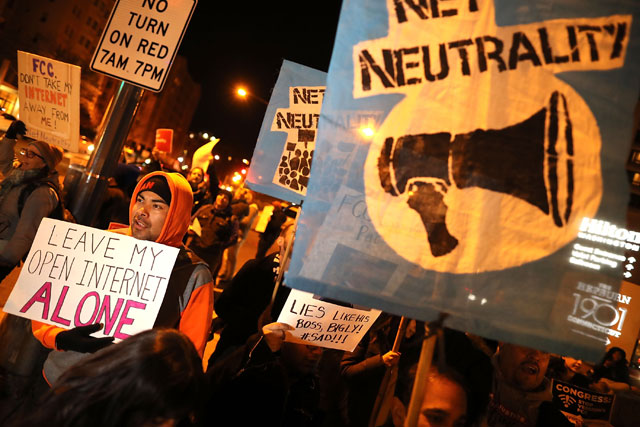
Truthout is an indispensable resource for activists, movement leaders and workers everywhere. Please make this work possible with a quick donation.
With the Federal Communications Commission scheduled to vote on repealing its popular net neutrality rules on December 14, the campaign to save them is going into hyperdrive both online and in the streets. Protests are erupting across the country, including a major rally outside the FCC headquarters in Washington, DC, on Thursday.
Activists are focusing their efforts on Congress, which could still step in and demand that the vote be delayed.
A group of tech leaders and pioneering internet developers, including Tim Berners-Lee, an MIT professor credited with inventing the original World Wide Web back in 1989, sent a letter on Monday to members of Congress who oversee the FCC requesting that they intervene and halt the vote.
“Over 23 million comments have been submitted by a public that is clearly passionate about protecting the Internet,” the experts wrote. “The FCC could not possibly have considered these adequately. Indeed, breaking with established practice, the FCC has not held a single open public meeting to hear from citizens and experts about the proposed Order.”
One of those comments came from authors of the letter, who submitted a 43-page joint comment on behalf of 200 prominent internet developers and pioneers back in July. The comment, which can be read here, claims that FCC Chairman Ajit Pai’s repeal proposal is based on “a flawed and factually inaccurate understanding of Internet technology,” according to the letter.
Pai, a Republican appointed FCC chairman by president Trump, has proposed a sweeping repeal of the 2015 Open Internet Order that gave the FCC power to prevent Internet Service Providers (ISPs), such as AT&T and Comcast, from blocking, slowing and playing favorites with online content. The rules also allow the FCC to regulate the internet more like a public utility that everyone needs to use rather than a luxury for those who can afford it.
Pai says lifting the rules will allow ISPs to offer “innovative” service packages and put more money into infrastructure, but digital rights activists say they are needed to prevent big telecom companies from shaping the internet in a way that would maximize profits and construct barriers to internet access for low-income consumers and minorities.
ISPs tend to be unpopular among consumers, and the same goes for Pai’s repeal proposal, but that has not kept the free-market ideologue from going forward with plans to gut the rules, along with a long list of consumer protections established under the Obama administration.
Republicans in Congress have already used their majority to repeal popular online privacy protections for consumers at the behest of big telecom companies, so it appears unlikely that they would step in to save net neutrality at the last minute. However, lawmakers are more susceptible to public pressure than appointees like Pai. Could Congress be convinced to thwart Pai’s plans, dealing a major blow to Trump’s deregulatory agenda in the process?
The digital rights group Fight for the Future, which has successfully influenced Congress with massive online mobilizations in the past, says net neutrality can still be saved if enough people join online protests and call their representatives in Washington.
“We’re already seeing key lawmakers crack under the pressure and come out in support of net neutrality,” Fight for the Future co-director Holmes Wilson told supporters in a recent email. “We’re organizing a mass online action for the 48 hours before the vote to drive hundreds of thousands more phone calls when we need them most.”
Some members of Congress are speaking out against the repeal, including Sen. Susan Collins, a Republican from Maine. Several progressive house members, including Rep. Maxine Waters and Rep. Keith Ellison, are scheduled to speak at the rally outside the FCC on Thursday. Organizers expect hundreds to attend.
Democrats are calling for a delay of the vote because the FCC has yet to resolve disputes over a large volume of fake comments supporting the repeal supporting the repeal proposal that were submitted to the agency’s docket along with stolen personal information, and activists stay there is still a chance to push lawmakers into action.
Some net neutrality proponents say that Congress could settle the debate by passing a law establishing net neutrality rules, but critics point out that ISPs make donations to members of Congress from both parties. Data from the Center for Responsive Politics shows that $101 million in campaign donations have flowed from ISPs to the coffers of current lawmakers since 1989. ISPs tend to favor Republicans, but Democrats have received 44 percent of donations.
Fight for the Future is planning a massive online protest on December 12. More information, along with details about contacting lawmakers, can be found at www.battleforthenet.com.
Press freedom is under attack
As Trump cracks down on political speech, independent media is increasingly necessary.
Truthout produces reporting you won’t see in the mainstream: journalism from the frontlines of global conflict, interviews with grassroots movement leaders, high-quality legal analysis and more.
Our work is possible thanks to reader support. Help Truthout catalyze change and social justice — make a tax-deductible monthly or one-time donation today.